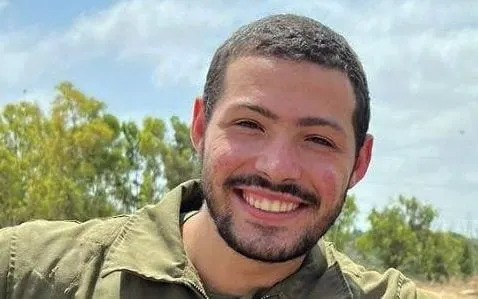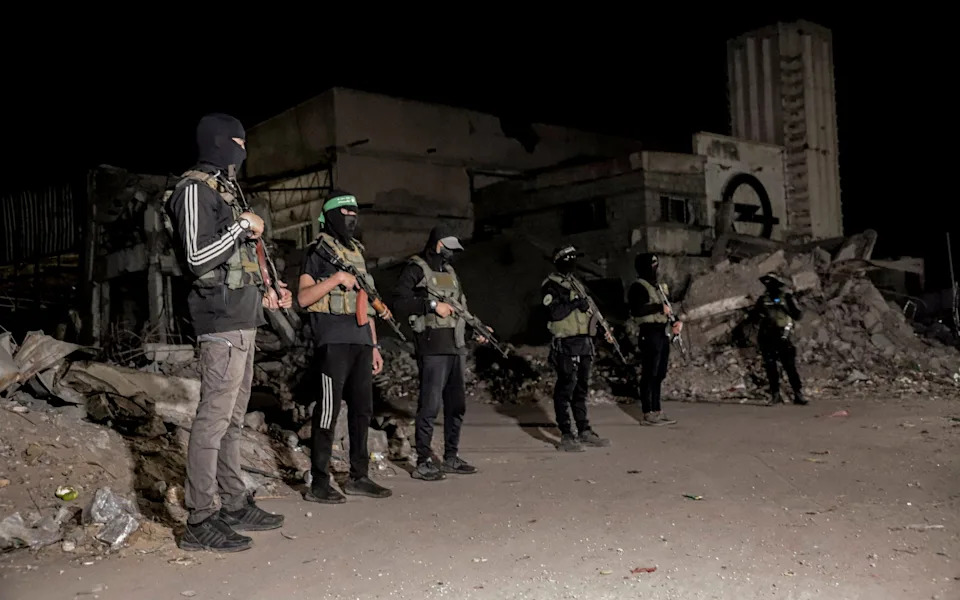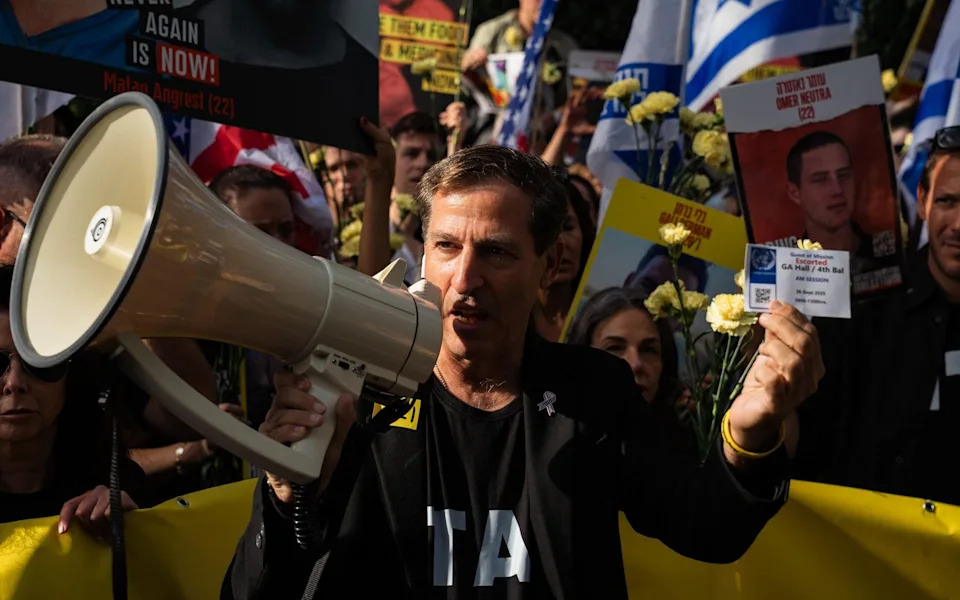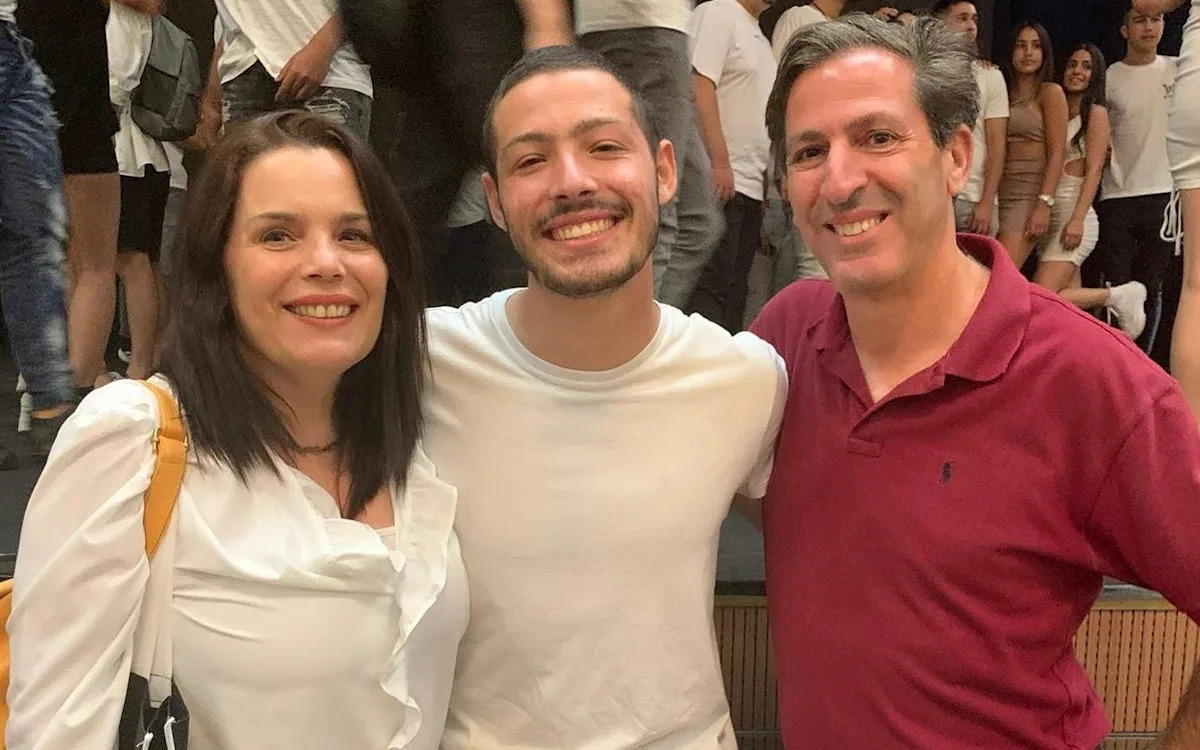Hamas is waging “psychological warfare” by delaying the return of deceased hostages, the father of a missing Israeli soldier has said.
Ruby Chen, 57, told The Telegraph he believed the terror group had a “pretty good idea” where the bodies of remaining hostages were located and could have released more by now.
Every evening, he and his family endure the agony of waiting for a phone call to tell them their beloved Itay is finally coming home.
So far, however, the call has not come.
Aged just 19, the armoured corps soldier was taken from his tank near the Gaza border on Oct 7 2023.
Six months later, the Israel Defense Forces (IDF) disclosed that, according to its best intelligence assessment, they believed he was murdered on the day of the massacre.
Since the return of all remaining living hostages on Oct 13, the loved ones of those presumed dead have endured an excruciating and unpredictable drip-feed of repatriations.

Itay Chen was captured from a tank near the Gaza border
Hamas has made claims – to which Donald Trump, the US president, seems sympathetic – that the terrorists are having difficulty locating the others because of the destruction in Gaza.
Some nights, Red Cross vans are summoned into the shattered landscape still controlled by Hamas, the start of an hours-long process that ends with formal identification back in Israel. Other nights, there is silence.
“You’re expecting to get the most painful and difficult phone call you will ever get in your lifetime, yet when it doesn’t come you feel disappointed,” said Mr Chen.
“We know they [Hamas] could have brought out more hostages by now, and they have decided not to. That’s a concrete decision that they have made.”
Under the terms of the Trump ceasefire deal, Hamas was obliged to return all 28 dead hostages by the same deadline as the living hostages: midday on Monday last week.

Hamas militants stand guard as they prepare to hand over hostage remains to Red Cross staff earlier this month – ABOOD ABUSALAMA/AFP via Getty Images
However, the agreement acknowledged that, for practical reasons, recovering all of them might take longer.
That leeway prevents the ceasefire from falling apart and allows negotiations for the post-war future of Gaza to progress, even when families like the Chens are in limbo.
But Israel has accused Hamas of failing to fulfil their side of the deal.
For the Chens and the families of the other 12 hostages yet to be released, the torment of the slow repatriations goes deeper than not having a body to grieve over, harrowing though that is.
‘It’s about saving lives’
Although the IDF shared the conclusions of their intelligence assessments, the families will only know beyond all doubt and all hope – however fleeting and unlikely – that their loved ones are dead when Hamas finally releases them.
“I’m a dead man walking,” said Mr Chen, referring to the limbo he currently inhabits, alongside his wife Hagit, and other sons Roy and Alon.
“It’s about saving lives. It may not be about my son, but it’s about my family.”
Even conceding that Hamas might find some deceased hostages more difficult to access than others, Mr Chen criticised the group for not communicating with mediators as to how their efforts were proceeding, creating an information void that prolonged the distress of families.
“It’s part of the psychological warfare,” he said.

Mr Chen has been a vocal critic of Benjamin Netanyahu, the Israeli prime minister – Yoav Ginsburg/ZUMA Press, Inc. / Alamy Live News
Born in New York and raised in Netanya, in central Israel, Itay Chen is one of two US citizens still held in Gaza.
On Wednesday, his father, a venture capitalist, secured a meeting with JD Vance during the vice-president’s visit to Israel.
“I think from an emotional standpoint, he got it, and I think he felt the pain of the hostage families,” said Mr Chen. “But of course, the focus for us as US citizens was the fact there are still two US citizens that are being held hostage, and asking the vice-president to find a way to leverage the fact that the United States is such a dominant component of the mediation.”
The question of what exactly the US or Israel should do to pressure Hamas is, said Mr Chen, “above my pay grade”.
But he points out that failing to return the missing hostages could “disadvantage” the people of Gaza by preventing the peace process from moving to its next stage.
He has been a bitter critic of Benjamin Netanyahu’s efforts to end the war and recover the hostages.
Last month, at the UN General Assembly in New York, he walked out of the Israeli prime minister’s address after he read out the names of the 20 living hostages, but not the names of the 28 presumed dead.
Credit: Reuters
Asked to sum up his feelings on Mr Netanyahu’s engagement with the hostage families, he reflects that “it’s easier to meet a vice-president of the United States or a secretary of state than the prime minister”.
Mr Chen and his family keep busy. Aside from meeting Mr Vance this week, on Thursday they attended the funeral of Tamir Adar, released this week, who also fought bravely on Oct 7, was abducted and did not survive the day.
On Tuesday, he attended another funeral – all part of the relentless solidarity and activism that has become a way of life for many of the hostage families.
“We don’t have time to sit and be sad – we keep on fighting,” he said.
In keeping with Jewish tradition, the funerals have taken place as soon as possible after formal identifications have been completed.
However, Mr Chen said that, in common with the other families, they have not yet planned a funeral for Itay.
“There’s always the doubt that maybe something could happen, a miracle, and maybe there would be a different ending,” he said.
“All the families have never planned anything in advance of this moment. It’s very difficult.”

